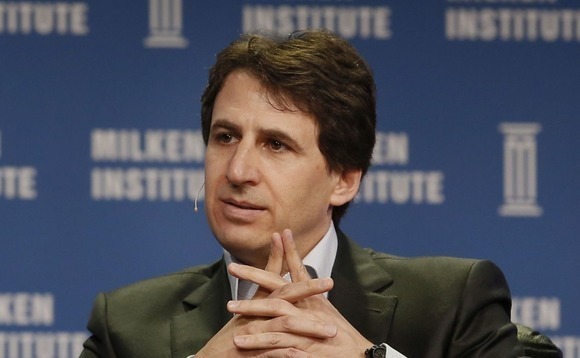
Key takeaways: Apollo Global Management's Marc Rowan

High valuations, pursuing complexity, and eradicating write-offs were on the agenda when Marc Rowan, co-founder and CEO of Apollo Global Management, spoke at the AVCJ Forum. Here are some highlights
On the current investment environment…
We have been in a liquidity-driven valuation cycle. Interest rates are low. Most bonds around the world trade below 2% – in Europe, it's certainly more pronounced than in the US – and returns are anemic. Government policy has pushed people to look for returns and that has driven up equity valuations. All the warning signs are there.
But we are in this unique position because of COVID, which was a reset of the clock in many ways. What we have in front of us is a period that looks very robust from a demand point of view. Yes, there are challenges on the supply side. But on the one hand, we see really good businesses, really good technological trends, and really interesting opportunities to invest in change and pivot points. On the other hand, a lot of that seems priced in. We come at the market from a notion of value. That doesn't mean you don't want to buy growth or that you don't want to participate in growth. It's that the purchase price matters, and I think it will continue to matter – but I will admit for the past 10 years it has not mattered and the more speculative you've been, the more risk you've taken, the more rewards you've seen.
Everything tells me that we as a firm, given our focus on price matters, would not have been as active, yet 2020-2021 have been off the charts in terms of the level of activity. When I dig down and try to understand where we are finding value, it is generally in complexity.
On the $5 billion Yahoo acquisition as an example of complexity…
We bought a pile of assets representing the third or fourth most visited internet sites in the world, some of it very slow growth with alarming trends, some of it very high growth. It's a package from Verizon that needed to be redone, and through structure and de-risking we have set ourselves up to participate in an exciting upside. No transaction like this one is done in an auction format. The seller ends up participating with you, they are still an owner of the business, and they want to understand the game plan and your commitment as an organization to make it happen.
What excites me is the number of people who have reached out to partner with us – gaming businesses, gambling businesses, financial information businesses. We will end up with a series of partnerships that leverage and monetize the vast ecosystem Yahoo had built on its own while we clean up the rest of the business.
On prioritizing enabling growth rather than cutting costs…
The days of shrinking yourself to greatness or cutting yourself to greatness passed almost two decades ago. It is almost always about finding that which someone else for some reason was not willing to invest in, not willing to focus on, not willing to resource, and taking advantage of that opportunity as opposed to a restructuring opportunity, a layoff opportunity.
Our business is a growth business. We participate in the growth economy, but we want it at a reasonable purchase price. Through our yield strategy, we are financing many of the originators in the fintech space. We have looked for holes in the market that allow us to participate in growth, recognizing that we aren't a venture firm.
The SPAC [special purpose acquisition company] world is an interesting place. Many companies that have explored going public through SPACs are growth-oriented companies. What we like about them is that in a world of high correlation, where everything trades on an index, almost the entire universe of SPACs is outside an index. When sentiment changes, there are always interesting opportunities. We issue SPACs, we partner on SPACs, we put equity into other people's SPACs, we provide PIPEs, we provide financing – we've put north of $5 billion to work at attractive rates of return in what I would characterize as a growth market.
On opportunities in financial technology…
It touches every part of our business. Every part of the financial services ecosystem today has a technology competitor, it doesn't matter if you are a record keeper, a depository, an exchange, an originator, a bank, a broker, a wealth manager, or any other part of the ecosystem, there is a tech-oriented company figuring out a solution.
We have sought to partner with fintech. We have made a principal investment in Motive [a fintech-focused private equity investor] and aligned our firms. We also view fintech through the eyes of us being a good backer of fintechs that want to compete with lending institutions, us being a user and a validator of financial technology. We recently agreed to put many of our financial solutions onto a blockchain led by Figure [a blockchain lending start-up]. And we are a large customer of fintech. Through our retirement services businesses, we are of the scale of some of the largest insurance companies.
On delivering consistent performance by minimizing losses…
Every fund has had its winners, and the interesting thing about the winners is they don't require much time. The management teams are great, they are hitting on all cylinders, you just want to get out of the way or help them accelerate. Every fund, from I to IX, has had its set of winners. Overall performance, over a long period of time, has been driven by an absence of zeroes.
We live in a market where, depending on how the incentives are set up within individual firms and on the personalities and cultures of the firms, private equity is often incented to hold out for 2x. If they don't get it, they end up waiting so long they end up with zero. What we've tried to do is create a culture where we decide to make investments as a firm, not as individuals. We all make mistakes. If something is going poorly let's recognize it's going poorly, roll up our sleeves right away and fix it. If it's worth $0.80 on the dollar, we should get $0.80 of our investors' capital back quickly and move on. Holding on and hope and prayer are not strategies. They are a recipe for bad performance.
We've had a decade in which the market has gone nowhere but up, except for four months. We have a decade's worth of people who have never really seen a down market. We need to make sure culturally that the lessons we all learned, starting in 1990, 1997, 2001, 2008 are not lost.
On diversity, equity, and inclusion (DE&I):
It's clearly something we are focused on at the senior levels. We measure it, put resources behind it; we are in the top third in what we need to do. But given we are an apprenticeship business and things change relatively slowly, the actual progress we will make over the next five years from the status quo won't constitute success. I don't think the industry is set up for success with DE&I.
We took a hard look at why we weren't making more progress. There is virtual agreement on the need for diversity, and the same can be said about inclusion. When you ask people about equity, no one defines it the same way. If you really push your partners to define equity, you can figure out their politics in about 30 seconds. And politics divides people. What we have tried to do is to unite people around the notion of opportunity. If you scratch the surface of anyone at Apollo and get their back story, they are the beneficiary of some lucky break – someone who put out a hand to them, some government program that helped them, or some act of happenstance that resulted in them being here. Everyone is prepared to lean in. We have made opportunity everyone's job.
Our DE&I department makes sure we are resourced and that once in a while we look at ourselves and make sure we are doing it equitably across the board. But if it is a HR-led program, five years from now, we will not succeed. It must be a firm-led program.
Latest News
Asian GPs slow implementation of ESG policies - survey
Asia-based private equity firms are assigning more dedicated resources to environment, social, and governance (ESG) programmes, but policy changes have slowed in the past 12 months, in part due to concerns raised internally and by LPs, according to a...
Singapore fintech start-up LXA gets $10m seed round
New Enterprise Associates (NEA) has led a USD 10m seed round for Singapore’s LXA, a financial technology start-up launched by a former Asia senior executive at The Blackstone Group.
India's InCred announces $60m round, claims unicorn status
Indian non-bank lender InCred Financial Services said it has received INR 5bn (USD 60m) at a valuation of at least USD 1bn from unnamed investors including “a global private equity fund.”
Insight leads $50m round for Australia's Roller
Insight Partners has led a USD 50m round for Australia’s Roller, a venue management software provider specializing in family fun parks.








